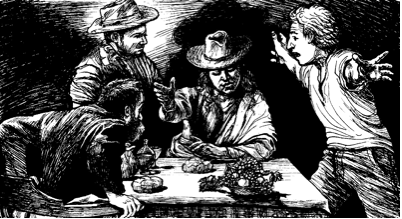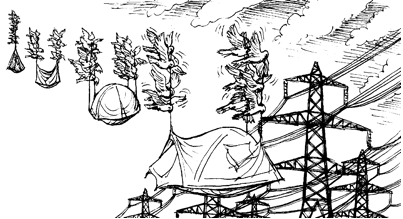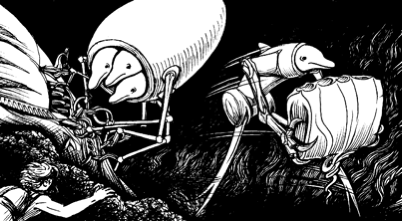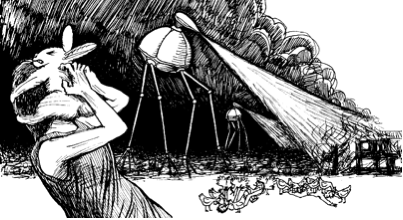The Dolphins’ Story
by Edward Burger
Dolphins are wiser than humans. They do not construct things but revere the natural environment. They know better than to tamper with the balance of nature. But because humans live predominantly on land and dolphins live predominantly in the sea, the extent of the devastation inflicted upon the environment by humans has only recently become apparent.
The dolphins are very concerned. They travel great distances to exchange news with other dolphins about what they and fellow organisms have witnessed in order to determine the frequency of humanity’s destructive behaviours and the extent of the devastation caused. They have witnessed the destruction of coastal forests, the pollution coming off the coast and the dwindling of fish and marine mammal populations caused by pollution and fishing.
Through their communication with terrestrial organisms they have learned that the devastation is even worse inland. Now too many species are on the verge of extinction. Entire ecosystems are collapsing. Great forests have been wiped out and whole reefs are dying. The dolphins have learned about the depletion of the ozone layer, about global warming and the melting of the icecaps. The time for action has come.
“They are a species gone mad! They cannot stop destroying!”
“If they destroy our atmosphere, all life will die!”
“Are we agreed that we must act to stop them?”
“Yes. But must we resort to manipulating nature?”
“It is a necessary evil. A war machine is not a thing of nature but a necessity.”
“Can we avoid harming other organisms in the process?”
“It is unavoidable. But as far as we can determine via our communication with other creatures — with water dwellers as well as with creatures such as sea birds and various other water-loving organisms who are in contact with terrestrial organisms — all species will accept whatever sacrifice is necessary to save our world.”
“The initial stages of construction may take a while. Before we can extract and shape the materials required to build our war machines, we will need to construct devices to do the extracting and shaping, but in order to do the constructing we must first develop some sort of costume that will enable us to grasp and manipulate objects with precision, but in order to make the costume in the first place, we must first construct very rudimentary attachments of some sort.”
* * *
Inside a seaside pub, a gathering of humans are drinking and talking. A male enters and rushes over to one of the tables.

Abe rushes over to one of the tables.
“You’ll never guess whot I jus’ saw!”
“Ya look like yurv seen a ghost, Abe.”
“It wern’t no ghost! It woz weirder. Unnatural it woz.”
“Whot woz it?”
“It woz dolphins!”
“Dolphins? There ain’t nothin’ weird ’bout dolphins, Abe.”
“I knows that, Slim. Not normal dolphins. That’s why it were so shockin! Then I saw two dolphins which were fixin’ a harness made o’ seaweed to another dolphin’s belly, an’ they tied ropes made o’ plant-root to its flippers which were connected ta pulleys an’ a framework with sticks o’ old bone attached to it which were wavin’ ‘round.”
“Ya think That’s weird?” said Wally the wrangler. “Ya ain’t never heard the story o’ young Hamish Burger who left his job as a horse hand ta go wanderin’. Well, that part o’ the country’s pretty dry, an’ Hamish jus’ didn't know the land well enuff. After two weeks he woz starvin’ ’n near dyin’ o’ thirst. With jus’ a few drops o’ water left in his bottle, he uncorks it an’ sets it in front o’ hisself, wonderin’ how much he could afford ta drink that day.
“But then a fly comes by an’ he tries ta catch it so he can eats it. But he misses ’n knocks over the bottle. He spills every drop. He woz done for, for sure. In fact, he were so close ta death ya wouldna thought anythin’ could’ve saved him.
“But then the ground suddenly bursts under him. He looks up ’n sees a enormous frog which come up from the ground. It were bigger than a bus! It woz one o’ them frogs which hibernates in the dry season then revives with the first rains, except this one got affected by chemical pollutants in the waterways. That’s how it got so big.
“Anyways, this spot o’ country hadn’t seen rain fo’ years coz o’ global warmin’, an’ now that this frog has been woked up, it dies straightway from sunstroke coz the sun had got a lot hotter than it used ta be, owin’ to the ozone layer. Anyways, Hamish now had lots o’ food, as well as lots o’ water on account o’ the reason these frogs live so long without water is coz they stores it — by the barrel load, in the case o’ this frog — under their bloated skin. In fact, Hamish got so much food ’n water, he sets up his own café. That’s how Ham Burgers woz invented, except the meat came from a big frog back then.”
“That’s nothin’,” said Gideon the goatherd. “Whot ’bout that fish which Ferdinan Wangari caught? He woz fishin’ by the Weber when this huge monster of a carp took his line. Well, his rod woz gonna break fo’ sure so he ties the line to a thick pole. But then that were breakin’ so he ties it to the harness of his horse. He tries ta pull the fish out with his horse but its jus’ too darn big. It woz pullin’ the horse in instead.
“So Gideon quickly hitches it to a team o’ bullocks. an’ them bullocks was pullin’ like blazes. That monster fish woz pressed up against the bank, tryin’ its darnedest not ta be caught. But the bullocks wins in the end. They pull the fish so hard it pulls the whole river out o’ shape. An’ that’s how the Wangari bend woz made.”
“Whot ya talkin’ ’bout some big dumb fish fo’?” said Slim the slaughterman. “We’re suppose ta be talkin’ ’bout smart critters.”
“Smart?” said Larry the logger. “I’ll give ya smart. Did ya hear the story ’bout the cockatoos ’n the loggers? Well there woz once a community o’ loggers whose whole existence were threatened by a bunch o’ heartless environmentalists. The loggers lived not far from the oldest forest in the world, which contained the oldest ’n tallest trees. It had reached maturity thousands o’ years ago an’ woz way past its use-by date, yet these environmentalists filled the forest with their tents, preventin’ any trees from bein’ logged. There woz no other forests nearby left fo’ the loggers ta log. How could they survive?
“Well, the loggers had allies; Plains Cockatoos preferred wide open spaces over cluttered ’n overgrown forests, an’ they came ta the rescue o’ the loggers. One night, as the selfish environmentalists woz asleep in their tents, a great mass o’ cockatoos comes, an’ very quietly they untied ’n unpegged the tents then carried ’em away with the environmentalists inside.
“They carried ’em to a distant plain ’n gently set ’em down in a very different type o’ forest. It woz a neater an’ more controlled forest that consisted o’ orderly rows o’ tall electricity pylons. The loggers blessed the cockatoos ’n raced into the old forest with chainsaws, bulldozers ’n trucks. They cleared the ground o’ all that wood which had been goin’ ta waste an’ put it ta good use. Once again, the loggers had money ta feed their families an’ they had wood fo’ their fires ta keep their children warm. An’ that’s how the Outback woz made.”

They carried the environmentalists to a very different type of forest.
“That ain’t smart!” said Trena the trapper. “I heard a story ’bout a real smart fox. We all know how smart foxes is. Well, one day this fox were bein’ hunted by a dozen hunters on horseback ’n two dozen hounds. First, the fox leads all the hounds into a long pipe which ends in a bottleneck, wide enuff fo’ the fox ta get through but not the hounds.
“Then the fox runs through a hedge an’ across a branch which spans a deep chasm. The hunters can't see the chasm coz o’ the hedge. They an’ their horses jump over the hedge ’n fall into the chasm, except fo’ one hunter who manages ta grab the branch. The hunter crosses to the other side but realises she lost her gun. Then she sees that the fox has it an’ is pointin’ it at her.
“Like I says, this fox were real smart, an’ one o’ the reasons it had managed ta live so long — fo’ it woz almost a adolescent, in fox years — woz coz it were always on its guard against bein’ out-foxed. In fact, as it woz sittin’ pointin’ the gun at the hunter, it couldn't believe that it could be in such a winnin’ situashun. Since the fox had the only gun in sight, the only way the fox could possibly be out-foxed would be if this were a trick gun which backfired on whoever woz holdin’ it. So, the fox points the gun at itself, pulls the trigger an’ kills itself.”
“But all them is jus’ tall stories!” yelled Abe. “These dolphins is real!”
“Old Helen Harcomb always sweared that fox were real, when she were still alive.”
“I ain’t never saw a animal point a gun at someone!”
“An’ we ain’t never seen a dolpin get up ’n start actin’ like a human.”
“Well I can show ’em ta anyone who'll come with me!”
“I got nearly a full beer in front o’ me, Abe. If ya reckon these dolphins is actin’ like humans, why don't ya get ’em ta come in here?”
Everyone started laughing, except for Abe. “Ah, forget it!” he said. “You’ll be hearin’ ’bout ’em from other folks soon enuff!”
Abe left the pub in a huff and picked up his basket of abalone. Abe was an abalone fisherperson. It was a pretty easy job. He’d poke around the coast in his little wooden boat then go overboard in his scuba gear with a big wire basket and collect abalone. There was more than enough abalone around. They were a small town but they had a fishery that delivered the daily catch to shops and markets in neighbouring towns.
Abe hadn’t yet collected his usual amount that day but he didn't feel like going back in. He took his basket to old Phil at the fishery.
“I ain’t got much today,” he told Phil. “I ain’t feelin’ too good. I jus’ didn't feel like fillin’ it, Phil.”
“Well that’s a shame. Ya can make it up tomorrow.”
“Tomorrow? We’ll see how I'm feelin’.”
“That bad, aye?”
“Yeah. Sort o’. Say, Phil... have ya heard any strange stories lately from other fisher men ’n women?”
“I'm always hearin’ stories, Abe.”
“Well have ya heard anythin’ ’bout dolphins?”
“Dolphins? Now... let me see... No, I can't say I have... not recently, at least. Oh wait. I heard somethin’ jus’ yesterday, though it wern’t that strange. Fanny O’Grady said she ain’t seen no dolphins ’round lately, which were unusual, she says. They're normally always hangin’ ’bout her boat coz she got such a big rig which is always haulin’ big catches.”
This bit of news put all kinds of ideas into Abe’s head, like maybe all the dolphins were busy doin’ thangs like they woz humans. But he didn’t say as much.
“Well let me know if ya hear anythin’ else,” he said.
“OK, Abe.”
The next morning Abe stood on the jetty next to his boat, wondering whether to go out or not. The sight of the dolphins had done more than unnerve him. One of them had looked him straight in the eye, and its gaze was so steady and cold, Abe was afraid of what these dolphins might be capable of. He could only hope that they remained friendly towards humans. But eventually Abe decided he would go out. He was a brave soul, was Abe. He wanted to keep an eye on these dolphins. He wanted to make sure they weren’t going to cause trouble.
Later that day, Abe entered the same seaside pub as yesterday and rushed over to the same table.
“I seen the dolphins again, Slim! We gotta call the police or somethin’. They're worse than yesterday! Who knows whot they could do. They could hurt someone!”
“Sit down, Abe. I'm sure we all want ta hear yer story, but we don't wanna see ya gettin’ into a huff, like yesterday. You jus’ calm yerself ’n tell us like so we can believe whot yer sayin’.”
“OK. Well, this time I saw a whole lot o’ them ’n they woz workin’ together, some carryin’ stuff ’n some woz workin’ machinery or somethin’. Some had legs, such as one had long legs which looked like they woz made from carved whalebone an’ it were stridin’ real fast carryin’ big containers back ’n forth which it were holdin’ with its wide arms which had big claws for hands.
“Instead o’ claws, another had long thin fingers, with somethin’ like a camera lens over its face, an’ it woz workin’ on somethin’ real small. Then I saw this thang which were like a big egg with three dolphins stuffed inside an’ it had half a dozen long arms with long fingers, an’ it woz workin’ real fast, fiddlin’ with some big contrapshun. Dont know whot the contrapshun were but it had lots o’ parts, like a big machine.
“Then there were another dolphin wearin’ a wide base, like a crabs, with four legs, an’ one o’ its arms woz a big heat ray which woz cuttin’ ’n meltin’ thangs. Seein’ that heat ray ’n that big machine, I got away quick! I don't think we can trust them dolphins!”

Some were carryin’ stuff ’n some woz workin’ machinery or somethin’.
“Well whot ’bout Bertha Billocks an’ her buffalo?” said Vittoria the veterinarian. “Bertha woz out on the Pilburra at night when she first sees that buffalo. She thought it were a small hill at first. Then she crept up on it while it slept an’ puts a great thick halter round its neck.
“Well, first Bertha ties five horses to the buffalo’s halter — draught horses, they woz, too, real big ones — coz she wants ta haul its ass to the market. But that buffalo were so darn big ’n stubborn, there wern’t no budgin’ it.
“Then Bertha gets another five; ten all up, an’ that’s when the buffalo starts diggin’ in its heels. Ya know, it finally took twenty o’ the biggest draught horses ta move that darn buffalo, which woz diggin’ in its heels all the way. that’s how the Billocks Gorge woz formed. It were the biggest darn buffalo anyone ever saw.”
“But that buffalo wern’t smart,” said Slim.
“Well, did ya hear ’bout the honey bees who rebelled?” said Penny the pest exterminator. “There woz ten hives which made up this bee farm, see, an’ all the bees woz so sick o’ havin’ their honey stolen all the time — honey which they had collected ta feed their youngens, see. But every time them humans came, they wore protective clothin’ an’ sprayed the bees with tranquilliser.
“The bees thought of attackin’ the humans while they woz in their homes but any kind o’ stingin’ mission would mean death ta lots o’ bees. So they decided ta make their own giant spray can, made out o’ beeswax, see, an’ instead o’ fillin’ it with tranquilliser, they filled it with deadly gas. Then in one great swarmin’ mass, the bees from all ten hives carried that giant spray can, went into them houses o’ the beekeepers, an’ killed ’em all!”
“Ya think that’s smart?” said Kim the chemical engineer. “Did ya hear ’bout the Juggawarra water rats? Well, there woz this big chemical plant down Juggawarra way which used ta pump all its waste water into a particular river. Well, it seems there were a populashun o’ water rats who lived on the river, an’ they got it in their heads that the chemical plant woz responsible fo’ the deteriorashun o’ the rivers ecosystem, even though the waste water were treated! Can ya believe it?
“Anyway, so them rats catches all the chemical plants employees in giant rat traps, puts ’em in giant rat cages, then feeds ’em the humans’ own chemical waste. All the humans could do thereafter woz throw up really toxic vomit, which woz like a river of acid. that’s how the Juggawarra Gorge were formed.”
“Well,” said Astro the astrophysicist, “I heard o’ this concert pianist, called Sam, who could only play chopsticks, which woz kind of appropriate on account o’ it were a lamb. Well, there woz some General who liked her lamb fried, so she decided ta test a atom bomb on it. An’ that’s how Crater Lake woz formed.”
Everyone started laughing, except for Abe. “Shut up, the lot o’ ya!” he yelled. “Ya gotta listen ta me! Whot I said ’bout the dolphins is true!”
They laughed even harder.
Abe run out of the pub and headed for the fishery. Maybe old Phil would believe him. At least she wouldn’t be drunk. In hindsight, Abe was surprised that he always found his mates at the pub no matter how early he knocked off. When did they ever get any work done?
When Abe arrived at the fishery, Phil wasn’t behind the counter. And someone else usually minded the counter when Phil was elsewhere, but there was no-one. Then Abe heard something, which again made him think of his mates at the pub. It was the sound of someone vomiting. He could hear it through the door on the other side of the counter.
Abe jumped over the counter, opened the door, and then he saw Phil and another staff member, imprisoned in a suspended cage. Over their faces were funnels that were connected to a big pipe, and they were vomiting into it. But suddenly water rats came leaping towards Abe from all directions.
Abe ran out of the fishery but came face to face with a massive swarm of bees. They were flying in a tight clump, carrying what looked liked a giant spray can. They turned the spray can towards him and Abe ran. He ran as fast as he could but all the while that spray can was close behind.
He ran out of the town and up a hill. that’s when he saw the dolphins’ machines. An enormous contraption burst through the water and rose high into the air, supported by four giant spindly legs. The hull was spherical, and on top of it was a laser canon that fired a heat ray. The ray passed over the fishery, the pub and every other building in the town, burning them swiftly to ash. A few people managed to escape and were fleeing the town.
That’s when the spray can turned from Abe and pursued these escapees instead. One by one the people dropped dead. A couple of them were felled by a flock of chickens, and one woman had a rabbit stuck to her face that was trying to asphyxiate her.
From the top of the hill, Abe could see for miles. All along the coastline the huge machines were rising from the water and destroying every building in existence. From the coast they headed inland, leaving the local fauna to take care of the survivors.

The huge machines destroyed every building in existence.
Humanity learned a serious lesson that day. It learned that there is truth in even the tallest stories. It also learned that there is no difference between reality and fantasy. If a story tells you that you shouldn’t believe it, should you believe it? Is the destruction of all humans necessary or is the destruction of all dolphins necessary? Pre-emptive warfare is the only way to ensure our safety. Kill all life before it kills you.
Copyright © 2006 by Edward Burger
